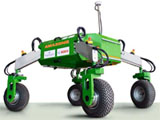Agricultural and Biological Systems Engineering, Department of

Department of Agricultural and Biological Systems Engineering: Faculty Publications
ORCID IDs
Xin Qiao http://orcid.org/0000-0003-3163-6231
Document Type
Article
Date of this Version
3-18-2021
Citation
Irrigation Science, 2021. https://doi.org/10.1007/s00271-021-00721-7
Abstract
Having an accurate yet simple method to estimate crop evapotranspiration ( ETC) is a vital component of reliable irrigation scheduling. In this study, two versions of the two-source energy balance (TSEB) model: the TSEB model with the Priestley–Taylor equation (TSEB-PT) and the Penman–Monteith equation (TSEB-PM), were used to estimate ETC of dry edible beans in western Nebraska. Compared with previous studies, this study is unique in that a Visual Basic software—Crop Canopy Image Analyzer (CCIA) was developed to process digitally captured RGB canopy images to obtain necessary canopy cover (CC) parameters for the TSEB models such as CC percentage and leaf shape factor (leaf area divided by its perimeter). Software-estimated CC percentage was closely correlated with commercial sensor-derived CC percentage with an R2 of 0.96. Additionally, estimated leaf shape factor was closely correlated with measured leaf shape factor with R2 of 0.99. Both TSEB-PT and TSEB-PM models estimated ETC well for fully irrigated dry edible beans with a root-mean-square error (RMSE) that ranged from 0.95 to 1.63 mm day−1 in 2018, and 0.75 to 1.35 mm day−1 in 2019, as compared to ETC estimated from FAO56. Furthermore, ETC from TSEB-PT and TSEB-PM were compared with a soil water balance-derived ETC and the RMSE ranged from 2.03 to 9.65 mm in an approximate 1-week period under four irrigation treatments ranging from dry land to fully irrigated. The proposed methods in this study, by integrating digital image processing with TSEB models, have great potential to be automated and used in field-scale operations for various irrigation management scenarios of many crops.
Included in
Bioresource and Agricultural Engineering Commons, Environmental Engineering Commons, Other Civil and Environmental Engineering Commons


Comments
U.S. government work